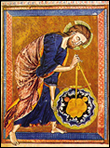The Architectonic Principle of the World
The Sceptical Chymist, 1661
I remember that a very skilful and credible person affirmed to me, that being in the Hungarian mines he had the good fortune to see a mineral that was there digged up, wherein pieces of gold of the length, and also almost of the bigness of a humane finger, grew in the ore, as if they had been parts and branches of trees.
And I have my self seen a lump of whitish mineral, that was brought as a rarity to a great and knowing prince, wherein there grew here and there in the Stone, which looked like a kind of sparr, divers little lumps of fine gold, (for such I was assured that trial had manifested it to be) some of them seeming to be about the bigness of peas.
But that is nothing to what our Acosta subjoines, which is indeed very memorable, namely, that of the morsels of native and pure gold, which we lately heard him mentioning he had now and then seen some that weighed many pounds; to which I shall add, that I my self have seen a lump of ore not long since digged up, in whose stony part there grew, almost like trees, divers parcels though not of gold, yet of (what perhaps mineralists will more wonder at) another metal which seemed to be very pure or unmixt with any heterogeneous substances, and were some of them as big as my finger, if not bigger. But upon observations of this kind, though perhaps I could, yet I must not at present dwell any longer.
To proceed therefore now (says Carneades) to the consideration of the analysis of vegetables, although my trials give me no cause to doubt but that out of most of them five differing substances may be obtained by the fire, yet I think it will not be so easily demonstrated that these deserve to be called elements in the notion above explained.
And before I descend to particulars, I shall repeat and premise this general consideration, that these differing substances that are called elements or principles, differ not from each other as metals, plants and animals, or as such creatures as are immediately produced each by its peculiar seed, and constitutes a distinct propagable sort of creatures in the universe; but these are only various schemes of matter or substances that differ from each other, but in consistence (as running mercury and the same metal congealed by the vapour of lead) and some very few other accidents, as taste, or smell, or inflammability, or the want of them. So that by a change of texture not impossible to be wrought by the fire and other agents that have the faculty not only to dissociate the small parts of bodies, but afterwards to connect them after a new manner, the same parcel of matter may acquire or lose such accidents as may suffice to denominate it salt, or sulphur, or earth. If I were fully to clear to you my apprehensions concerning this matter, I should perhaps be obliged to acquaint you with divers of the conjectures (for I must yet call them no more) I have had concerning the principles of things purely corporeal: for though because I seem not satisfied with the vulgar doctrines, either of the Peripatetic or Paracelsian schools, many of those that know me, (and perhaps, among Them, Eleutherius himself) have thought me wedded to the Epicurean hypotheses, (as others have mistaken me for an Helmontian) yet if you knew how little conversant I have been with Epicurean authors, and how great a part of Lucretius himself I never yet had the curiosity to read, you would perchance be of another mind; especially if I were to entertain you at large, I say not, of my present notions; but of my former thoughts concerning the principles of things. But, as I said above, fully to clear my apprehensions would require a longer discourse than we can now have.
For, I should tell you that I have sometimes thought it not unfit, that to the principles which may be assigned to things, as the world is now constituted, we should, if we consider the Great Mass of matter as it was whilst the Universe was in making, add another, which may Conveniently enough be called an architectonic principle or power; by which I mean those various determinations, and that skilful guidance of the motions of the small parts of the universal matter by the most wise author of things, which were necessary at the beginning to turn that confused Chaos into this Orderly and beautiful world; and especially, to contrive the bodies of animals and plants, and the seeds of those things whose kinds were to be propagated. For I confess I cannot well conceive, how from matter, barely put into motion, and then left to it self, there could emerge such curious fabricks, as the bodies of men and perfect animals, and such yet more admirably contrived parcels of matter, as the seeds of living creatures.
The Sceptical Chymist (1661), in R. Boyle, The Works of the Honourable Robert Boyle, vol. I, (Bristol - Sterling: Thoemmes Press, 1989), pp. 568-569.





